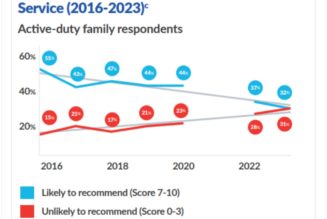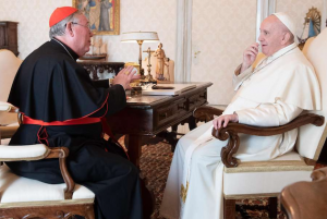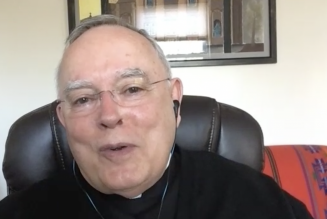Today we praise the Lord with Psalm 103, a psalm written by King David: “Merciful and gracious is the Lord, slow to anger and abounding in kindness. Not according to our sins does he deal with us, nor does he (repay) us according to our crimes. As far as the east is from the west, so far has he put our transgressions from us.” David rejoices that the Lord is merciful and slow to anger, not punishing our sins in the measure we deserve. God forgives our sins and removes them from us, “as far as the east is from the west.”
Let’s look more closely at that last line: “As far as the east is from the west, so far has he put our transgressions (our sins) from us.” How far away is the east, the place of sunrise, from the west, the place of sunset? Depending upon where you’re standing, your horizons may not be far away. But when ancient peoples walked beyond the next range of hills which blocked their view they did not imagine they had reached the ultimate place of the sun’s rising or setting. They knew that both east and west went on and on, farther still. What they likely did not know when King David wrote his psalms 3,000 years ago is that our Earth is spherical.
 We know a number of facts that they didn’t back then, but ancient peoples were not less intelligent thinkers than us today. Could you, without using modern technology, prove that the world is round? Well, in the 3rd century B.C., Greek astronomers did and calculated the Earth’s circumference without using telescopes, photographs, airplanes, or satellites. So, given what we know now, how far is the east from the west?
We know a number of facts that they didn’t back then, but ancient peoples were not less intelligent thinkers than us today. Could you, without using modern technology, prove that the world is round? Well, in the 3rd century B.C., Greek astronomers did and calculated the Earth’s circumference without using telescopes, photographs, airplanes, or satellites. So, given what we know now, how far is the east from the west?
Because the world is a globe, east and west eventually come together. If you were to travel from here due east while I journeyed due west, if we both kept going on making equal progress, we would meet once more near a border of China and Mongolia. If east and west actually meet together how are sins taken far from us “as far as the east is from the west” like this God-inspired psalm says?
Now some may say I’m taking biblical poetry too literally. A figure of speech doesn’t need to be painfully accurate to be true. We may know that each new morning comes from our perspective upon this spinning planet, but in ordinary conversation it’s not wrong to say the Sun rises. Or, in romantic poetry, a woman’s skin need not be made of real porcelain nor a man’s chin actually be chiseled for such metaphors to convey truths about their beauty. Saying the Lord removes our sins far away from us like the east is distant from the west is a straight-forward enough image on first impression. But humanity’s later discovery that these two opposites unite suggests an additional interpretation for this scripture passage about how our Lord takes our sins away.
Here is the puzzle God faced in regards to our redemption: how could the all-holy Trinity ever forgive humanity’s sins? If the Lord were to forgive us by merely ignoring our crimes, then what of cosmic justice and divine righteousness? There was a price to be paid which we sinners could not pay, but God found a way. As was foretold in the 85th Psalm: ‘Kindness and truth met; justice and peace kissed. Truth sprung out of the earth and justice looked down from heaven.’ Just as east and west were distant contraries which surprisingly converged, so sinless divinity and estranged humanity were amazingly joined through the Incarnation and Sacrifice of Jesus Christ. Jesus separates us from sin by uniting himself to us.
What our Lord Jesus has done to save us is reflected in all of this Sunday’s readings. In our first reading, Jesus’ great ancestor David took King Saul’s spear and water jug and then returned them, thereby proving his goodness to his persecutors. Later on the Cross, Jesus takes the soldiers’ spear into his side and water pours out with Christ’s blood, proving his love for us. In our second reading, St. Paul notes the first man, sinful Adam, is saved by the new God-man, Christ. “The first man was from the earth, earthly; the second man, from heaven.” And in our Gospel, Jesus observes that if you love those who love you and do good to those who do good to you, what is so remarkable about that? Jesus says, “Love your enemies and do good to them.” St. Paul wrote to the Romans that “God proves his love for us in this: that while we were still sinners Christ died for us.” We struck him on one check and he offered the other one as well. We took his cloak and he let us strip him of his tunic. We could not purchase our own redemption but Jesus paid the cost knowing we could not pay him back. “Indeed,” as St. Paul writes, “while we were enemies, we were reconciled to God through the death of his Son…”
Jesus Christ, the first of the Most High’s children, is kind to the ungrateful and the wicked, and merciful, just as his Father is merciful. He has loved his enemies, done good to those who hate him, blessed those who curse him, and prayed for those who mistreat him. He calls us to follow his own Christian example that we may share in his resurrected glory and heavenly rewards, “a good measure, packed together, shaken down, and overflowing,” poured into our laps. Praised be Jesus Christ! Let us always praise and thank him – for who he is and what he’s done. “From the rising of the Sun to its setting, may the name of the Lord be praised.”
Join Our Telegram Group : Salvation & Prosperity









